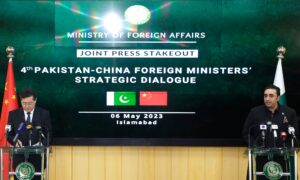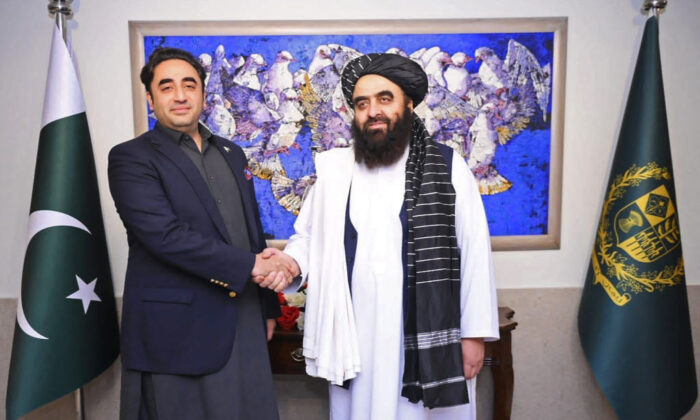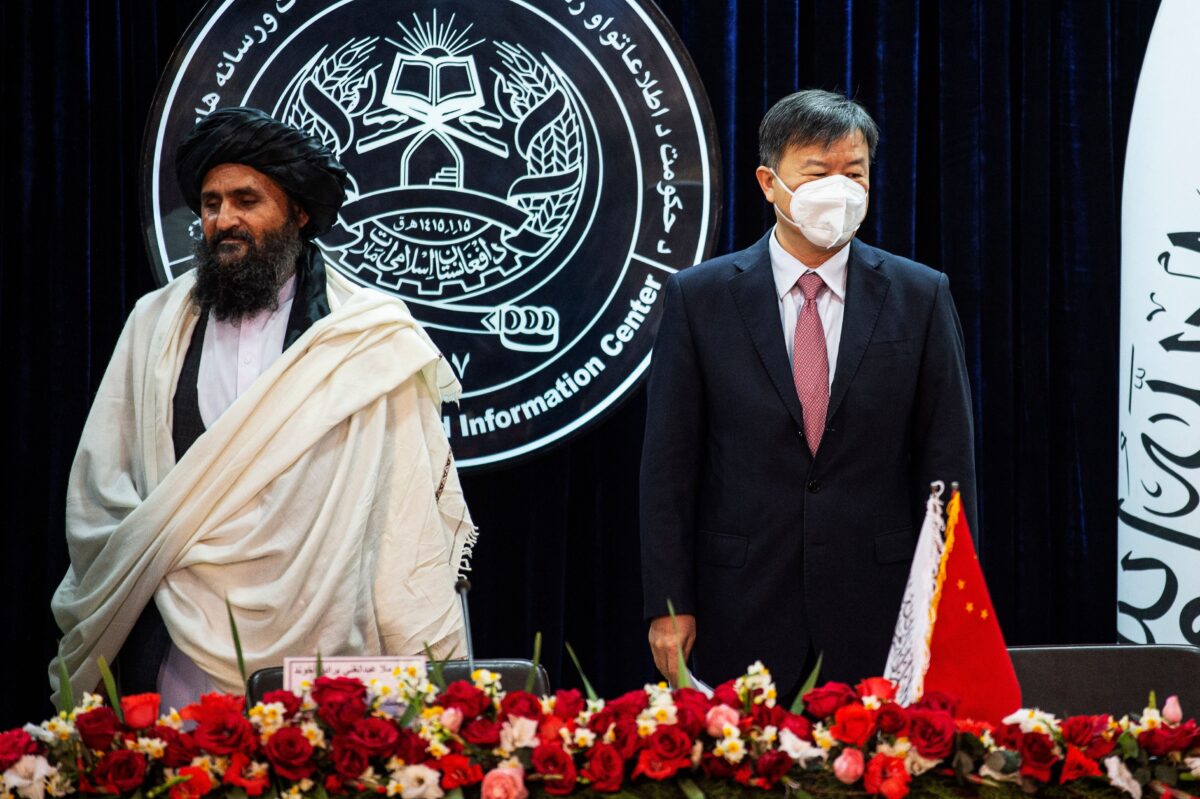China, Taliban Deepen Ties as Afghanistan Joins Beijing’s Infrastructure Plan
China, Pakistan, and the Taliban have decided to extend the Chinese Belt and Road Initiative (BRI) to Afghanistan during their fifth tri-party foreign ministers dialogue in Islamabad on May 6. “The three sides reaffirmed their resolve to fully harness Afghanistan’s potential as a hub for regional connectivity. Reaffirming their commitment to further the trilateral cooperation under the Belt and Road Initiative (BRI), and to jointly extend the China-Pakistan Economic Corridor to Afghanistan,” said a joint statement released by Pakistan’s Ministry of Foreign Affairs two days later. The announcement comes amid various developments in the South Asian region. Multiple experts told The Epoch Times that the tri-party announcement on BRI in Afghanistan indicates China’s economic priorities in Afghanistan amid growing regional competition for connectivity and mineral resources. “This announcement indicates that the Taliban-controlled Afghanistan is a priority area for China’s economic expansion. Beijing is interested in extracting mineral resources from Afghanistan and using the country’s trade routes to reach Iran and Turkey as an alternative to Central Asia,” Adnan Aamir, an Islamabad-based journalist who covers Chinese interests in Pakistan, told The Epoch Times in an email. Taliban is not in a position to make any financial commitments, and the situation is complicated, according to Aamir, because the BRI projects involve loans, and both China and Pakistan haven’t formally recognized the Taliban. The idea of Afghanistan joining the BRI is more “of a wish than an immediate reality,” he said. The joint statement addressed the Taliban as the “Afghan Interim Government” and mentioned that the tri-party meeting wanted to encourage “hard connectivity” in infrastructure and “soft connectivity” in norms and standards, and has decided to explore the facilitating measures for the movement of people and trade activities between the three countries. K. Siddhartha, a strategic thinker and Earth scientist, told The Epoch Times that China’s moves in Afghanistan are propelled by the growing needs of the Chinese economy for minerals and raw materials. “Afghanistan’s geology has helped it to be a reservoir of minerals; it’s a different matter that the Afghans have not used it, nor will they,” said Siddhartha, a former adviser to multiple countries. Earlier in April, a Chinese company offered the Taliban $10 billion and a proposal to build key strategic infrastructure connecting north-south Afghanistan in exchange for access to the country’s lithium reserves. Siddhartha said China would require an increased supply of lithium to market its electric vehicles and lower the cost of production to make it more competitive. “China will soon wish to control the global automobile market,” he said. The Taliban’s Ministry of Mines and Petroleum said in its press release that China had proposed developing three infrastructure projects in exchange for lithium: the Salang Tunnel that connects north Afghanistan with Kabul, the Nuristan highway that connects Kunar to Laghman, and a power dam project. Beijing announced the construction of an industrial park in New Kabul City last year. Furthermore, Chinese state media Global Times has repeatedly said that after the Taliban came to power, the Afghans can “determine their own destiny.” Siddhartha said the BRI model links Afghanistan to its main mining areas in the same way that colonial Britain linked India’s major cities for the economic benefit of the British empire. “Helping themselves to strip the Afghan economy naked without any concomitant effect on the hinterland … and, at the same time, ensuring the security of supplies through the selective deployment of their armed personnel,” he said. Siddhartha believes economic agendas based on projects like BRI don’t result in composite development. “Of course, the possibility of sending Chinese security troops into the region cannot be undermined at all,” he said. Pakistan’s Foreign Minister Bilawal Bhutto Zardari (L) shakes hands with Afghanistan’s Foreign Minister Amir Khan Muttaqi during a meeting in Islamabad on May 7, 2023. (Pakistan’s Ministry of Foreign Affairs/AFP/Getty Images) Former Afghan Regime Experts said buzz about the BRI in Afghanistan is not new, and it has happened before during the former Afghan regime’s time, but without any substantive results. “The idea of Afghanistan joining the Belt and Road Initiative (BRI) or the China-Pakistan Economic Corridor (CPEC) is not new, as it has been previously offered to the former Kabul government, as well as to other regional countries such as Turkey and Central Asian states,” said Aamir. Homira Rezai, chair of the Hazara Committee in the UK (HCUK), told The Epoch Times that the former Afghan regime experienced many challenges to enable Afghanistan’s participation in BRI. Rezai believes that despite several meetings between Chinese and Afghan delegates, the BRI couldn’t h

China, Pakistan, and the Taliban have decided to extend the Chinese Belt and Road Initiative (BRI) to Afghanistan during their fifth tri-party foreign ministers dialogue in Islamabad on May 6.
“The three sides reaffirmed their resolve to fully harness Afghanistan’s potential as a hub for regional connectivity. Reaffirming their commitment to further the trilateral cooperation under the Belt and Road Initiative (BRI), and to jointly extend the China-Pakistan Economic Corridor to Afghanistan,” said a joint statement released by Pakistan’s Ministry of Foreign Affairs two days later.
The announcement comes amid various developments in the South Asian region. Multiple experts told The Epoch Times that the tri-party announcement on BRI in Afghanistan indicates China’s economic priorities in Afghanistan amid growing regional competition for connectivity and mineral resources.
“This announcement indicates that the Taliban-controlled Afghanistan is a priority area for China’s economic expansion. Beijing is interested in extracting mineral resources from Afghanistan and using the country’s trade routes to reach Iran and Turkey as an alternative to Central Asia,” Adnan Aamir, an Islamabad-based journalist who covers Chinese interests in Pakistan, told The Epoch Times in an email.
Taliban is not in a position to make any financial commitments, and the situation is complicated, according to Aamir, because the BRI projects involve loans, and both China and Pakistan haven’t formally recognized the Taliban.
The idea of Afghanistan joining the BRI is more “of a wish than an immediate reality,” he said.
The joint statement addressed the Taliban as the “Afghan Interim Government” and mentioned that the tri-party meeting wanted to encourage “hard connectivity” in infrastructure and “soft connectivity” in norms and standards, and has decided to explore the facilitating measures for the movement of people and trade activities between the three countries.
K. Siddhartha, a strategic thinker and Earth scientist, told The Epoch Times that China’s moves in Afghanistan are propelled by the growing needs of the Chinese economy for minerals and raw materials.
“Afghanistan’s geology has helped it to be a reservoir of minerals; it’s a different matter that the Afghans have not used it, nor will they,” said Siddhartha, a former adviser to multiple countries.
Earlier in April, a Chinese company offered the Taliban $10 billion and a proposal to build key strategic infrastructure connecting north-south Afghanistan in exchange for access to the country’s lithium reserves.
Siddhartha said China would require an increased supply of lithium to market its electric vehicles and lower the cost of production to make it more competitive. “China will soon wish to control the global automobile market,” he said.
The Taliban’s Ministry of Mines and Petroleum said in its press release that China had proposed developing three infrastructure projects in exchange for lithium: the Salang Tunnel that connects north Afghanistan with Kabul, the Nuristan highway that connects Kunar to Laghman, and a power dam project.
Beijing announced the construction of an industrial park in New Kabul City last year. Furthermore, Chinese state media Global Times has repeatedly said that after the Taliban came to power, the Afghans can “determine their own destiny.”
Siddhartha said the BRI model links Afghanistan to its main mining areas in the same way that colonial Britain linked India’s major cities for the economic benefit of the British empire.
“Helping themselves to strip the Afghan economy naked without any concomitant effect on the hinterland … and, at the same time, ensuring the security of supplies through the selective deployment of their armed personnel,” he said.
Siddhartha believes economic agendas based on projects like BRI don’t result in composite development. “Of course, the possibility of sending Chinese security troops into the region cannot be undermined at all,” he said.

Former Afghan Regime
Experts said buzz about the BRI in Afghanistan is not new, and it has happened before during the former Afghan regime’s time, but without any substantive results.
“The idea of Afghanistan joining the Belt and Road Initiative (BRI) or the China-Pakistan Economic Corridor (CPEC) is not new, as it has been previously offered to the former Kabul government, as well as to other regional countries such as Turkey and Central Asian states,” said Aamir.
Homira Rezai, chair of the Hazara Committee in the UK (HCUK), told The Epoch Times that the former Afghan regime experienced many challenges to enable Afghanistan’s participation in BRI.
Rezai believes that despite several meetings between Chinese and Afghan delegates, the BRI couldn’t have been implemented earlier because the two sides lacked a real relationship.
Under the former regime, Afghanistan was already working on the Five Nations Railway Corridor and the Afghanistan Railway Plan with international support and didn’t require China’s financial help.
“The situation is completely different now. The Taliban sees China as their main source of financial independence. With the sanctions from the West and the financial crisis, China has changed their position on Afghanistan and have pursued a greater interest in Afghanistan,” said Rezai.
Grant Newsham, a retired U.S. Marine colonel and a senior research fellow at the Japan Forum for Strategic Studies, told The Epoch Times that the funniest part about this announcement to bring the Taliban into the BRI is the way Pakistan has been credited for it, along with the Chinese.
“Pakistan? They’ve been financially broke for decades. If they say something, like BRI is a splendid opportunity, one should assume the opposite to be true,” said Newsham.
Rezai said that the announcement works for Pakistan’s interests.
“With the cooperation of Pakistan, China is making a real effort to strengthen their presence and position in Afghanistan. And, of course, Afghanistan joining the BRI will greatly substantiate Pakistan’s transit routes. There is a win-win economic situation for both Pakistan and China,” said Rezai.
She believes the international community should monitor Afghanistan’s developments more closely.
“We know that China has only an economic agenda and the upper hand in this deal. Pakistan seems to be the strategic center for this partnership. This could be an effort to empower [the] Taliban more, which can only end badly for the people of Afghanistan,” she said.

Vacuum Left by US
Experts said since the United States left Afghanistan, there’s a vacuum that China is speedily trying to fill in, not only for advantage in Afghanistan but in the wider Central Asian and South Asian region. This has wider geopolitical repercussions.
“This is a significant development. China will become more involved and assertive in West Asia, South Asia, and Europe. The void left by the U.S. will now be filled by China,” Shekhar Sinha, a member of the board of trustees at India Foundation and the former chief of India’s Integrated Defense Staff, told The Epoch Times.
“While it doesn’t legitimize the Taliban government, China will deal with governments where its interests lie,” he said.
Newsham said Beijing perceives an advantage in having the Taliban government politically on its side.
“If China has Afghanistan in its camp, the Americans don’t. Afghanistan is now one of China’s pieces on the game board—and by definition, a place where the Americans no longer are, nor have any influence,” he said.
With the Taliban as allies, China’s influence in Central Asia increases, according to Newsham, who said this equation works to Russia’s disadvantage. He said it remains to be seen if the Chinese would fare better than other foreigners in Afghanistan.
“China actually capitalizing on this opportunity will be interesting to watch—especially once mobs of Chinese workers come into Afghanistan,” said Newsham.
The situation impacts India because it’s the only major country in the region refusing to participate in the Chinese-led project. India is also strategically the most affected by developments inside Pakistan and Afghanistan, which lie in its geographical vicinity.
“In terms of geography, Afghanistan is an indirect way of pressuring India and depriving the Indians of a sort of ‘strategic depth’ that forced the Pakistanis to pay attention to both India and Afghanistan at the same time. Now, in theory, the Pakistanis can devote all their attention—military and terroristic—on India,” said Newsham.












